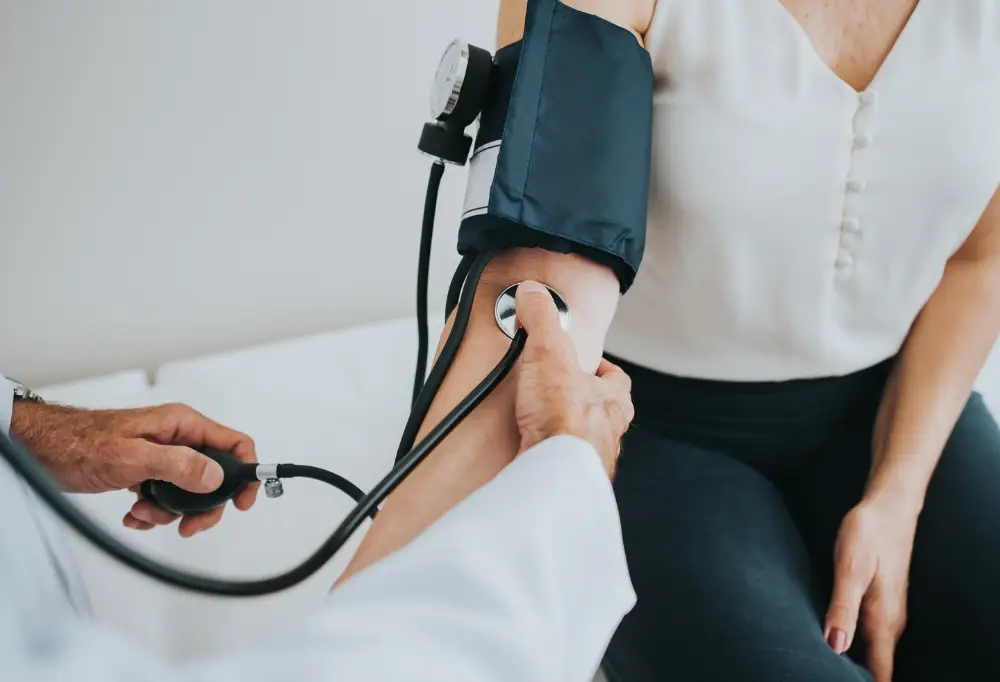Reviewed by Julie Murphy, APRN, WHNP of Forum Health Tampa
At a Glance:
- Explore how hormonal shifts during menopause, particularly the drop in estrogen, can increase the risk of high blood pressure.
- Understand the factors influencing high blood pressure in menopausal women, including age, body weight, and the timing of menopause onset.
- Discover lifestyle modifications and medical interventions that can help manage high blood pressure during menopause, such as diet changes, exercise, and possibly hormone replacement therapy.
Going through menopause or “the change” often comes with a slew of symptoms: night sweats, hot flashes, low libido, and irritability – just to name a few. But there’s another question not often discussed: can menopause cause high blood pressure? With the decrease in hormones that comes from perimenopause and menopause, a woman’s body will go through many surprising shifts to adjust to this hormonal imbalance. Learn the facts, the risks, and everything you need to know about how menopause affects your blood pressure levels.
The Link Between Menopause and High Blood Pressure
During perimenopause and menopause, there are many hormonal shifts women go through, specifically a drop in estrogen. This affects female hormones and blood pressure. When there is a decline in estrogen levels, the risk of coronary heart disease (CHD) becomes more apparent, specifically hypertension (high blood pressure). The basal metabolic rate drops during menopause which can affect insulin sensitivity and weight gain – also contributing to risk of blood pressure issues.
Estrogen is an important hormone that helps you function healthily on a day-to-day level. It is related to blood pressure because estrogen specifically helps keep blood vessels elastic and relaxed, and it helps regulate sodium levels in the body. So, when estrogen levels are not at an optimal level, blood vessels can become stiffer and narrower, and unable to handle as much salt, which can all lead to high blood pressure.
A Dutch study found that the decline in ovarian function, which leads to decreased estrogen levels, plays a significant role in the development of high blood pressure in perimenopausal and menopausal women. The researchers noted that this increase in blood pressure was particularly pronounced in overweight women, who experienced significant rises in both systolic and diastolic readings.
Systolic blood pressure refers to the number on the top of a blood pressure monitor and explains the force that creates pressure on your blood vessels (a normal number is below 120, and a high blood pressure number is 130 or above). The diastolic reading, the bottom number on the blood pressure monitor, refers to the pressure in the arteries when the heart rests between beats. During this time, the heart fills with blood and receives oxygen (an average number is lower than 80, and hypertension refers to higher than 80).
The study found that systolic blood pressure was higher in women than men after the age of 60, whereas it was higher for men when women were aged 40 and below.
When it comes to female hormones and blood pressure, factors that cause a greater risk of high blood pressure include age, onset of the timing of menopause, and weight.
Risk Factors and Symptoms
The relationship between menopause and hypertension is a complex one, with several risk factors at play.
- Age: As you age, your arteries naturally become stiffer, which can increase blood pressure. This increases as estrogen levels drop.
- Lifestyle: An unhealthy diet, not enough exercise, and smoking or excessive alcohol consumption can also contribute to hypertension. Smoking damages blood vessels and increases blood pressure, and heavy drinking also increases blood pressure.
- Genetic predisposition: If you have a family history of high blood pressure, you’re more susceptible to developing hypertension yourself. With menopause and hypertension, it’s best to take precautionary measures (like eating well and staying active) to keep your blood pressure numbers normal.
- Symptoms that may indicate high blood pressure: Hot flashes and high blood pressure may go together: women who get hot flashes have higher blood pressure than those who don’t, says a study led by Weill Cornell Medical College. High blood pressure can lead to heart disease, which is responsible for half of all American women’s deaths aged 50 and older.
- Menopause and high blood pressure can share symptoms: Signs like headaches, fatigue, and difficulty sleeping could indicate high blood pressure – but when going through perimenopause or menopause, it’s important to check your blood pressure levels and talk to your doctor.
Learn more about cardiovascular disease conditions associated with menopause.
Managing High Blood Pressure During Menopause
Hypertension during menopause may sound scary, but luckily, there are many lifestyle shifts you can make to ensure you’re taking good care of your cardiovascular health.
- Lead a balanced, mindful lifestyle. The CDC reports that eating healthy foods can help. Try whole foods with a low sugar content and limit processed foods, regular physical activity, optimal sleep, and stress reduction. These are all equally important when it comes to maintaining a healthy weight, which will keep your risk of hypertension much lower. Limit your alcohol intake (do not overindulge) and quit smoking if you’re a smoker.
- Regularly monitor your blood pressure levels. It’s easy to purchase a home blood pressure cuff at your local drug store or online. The number on the top, your systolic blood pressure, should be 120 or below for a normal range. The bottom number, your diastolic blood pressure, should be lower than 80. If either of those numbers are significantly higher, it’s time to see your doctor and seek help for high blood pressure.
How to control high blood pressure during menopause
As women go through perimenopause and menopause, their bodies undergo various changes, making it crucial to prioritize their health, including monitoring their blood pressure. One option to consider is bioidentical hormone replacement therapy (BHRT), a natural approach to rebalancing hormones and increasing estrogen levels, which can help reduce the risk of hypertension. Bioidentical hormone therapy is similar to traditional hormone therapy but uses naturally derived ingredients found in plants. The molecular structure of BHRT is identical to those found in the human body. Those who have night sweats, hot flashes, sleep issues, low libido, low energy, or cognitive decline issues as a result of perimenopause or menopause can find relief through hormone therapy for menopause. BHRT comes in many forms (such as creams, pellets, troches, or pills), and with our experienced healthcare team, you’ll get a customized BHRT plan fit for your lifestyle.
Learn more about customized BHRT plans today for managing hormone imbalances due to perimenopause or menopause.
When it comes to monitoring high blood pressure while going through menopause, it’s important to have an experienced healthcare team behind you. Schedule your consultation with our healthcare providers here at Forum Health to get a personalized healthcare plan today.
FAQs
Yes, dehydration can lead to high blood pressure. When there isn’t enough water in the body, blood vessels constrict. Certain blood pressure medications cause dehydration, so it’s important to hydrate regularly and talk to your doctor when prescribed high blood pressure medication.
A stroke-level blood pressure is an extremely high blood pressure number that can cause a stroke or other serious health condition. Doctors recommend keeping blood pressure levels under 130/80 to minimize stroke risk. 180/120 mm Hg is considered a hypertensive emergency, and you should seek medical care immediately.
No, high blood pressure does not make you hot directly. However, there can be indirect correlations. Women who get hot flashes have a higher blood pressure than those who do not, says this study led by Weill Cornell Medical College. And, underlying conditions and certain medications can create a “flushed” feeling.
Yes, the hormonal shifts in menopause can cause high blood pressure, and this can be applied to certain perimenopause cases as well. This happens when estrogen levels drop. Estrogen helps keep blood vessels elastic and relaxed, and it regulates sodium levels in the body. Without adequate estrogen, blood vessels can become stiffer and narrower and unable to handle as much salt, which can lead to high blood pressure.
Yes, your thyroid can contribute to high blood pressure. In hyperthyroidism, an overproduction of thyroid hormones, it increases heart rate and blood flow, potentially leading to high blood pressure. This can affect up to 36% to 59% of people with hyperthyroidism.






